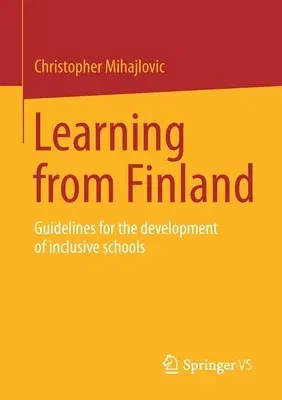Christopher Mihajlovic
(Author)Learning from Finland: Guidelines for the Development of Inclusive Schools (2023)Paperback - 2023, 15 February 2023

Qty
1
Turbo
Ships in 2 - 3 days
In Stock
Free Delivery
Cash on Delivery
15 Days
Free Returns
Secure Checkout

Print Length
206 pages
Language
English
Publisher
Springer vs
Date Published
15 Feb 2023
ISBN-10
3658401761
ISBN-13
9783658401764
Description
Product Details
Author:
Book Edition:
2023
Book Format:
Paperback
Country of Origin:
NL
Date Published:
15 February 2023
Dimensions:
21.01 x
14.81 x
1.17 cm
ISBN-10:
3658401761
ISBN-13:
9783658401764
Language:
English
Location:
Wiesbaden
Pages:
206
Publisher:
Weight:
267.62 gm